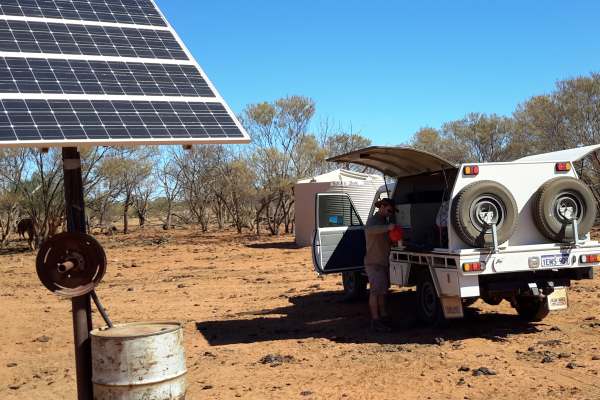Published on the 27/08/2020 | Written by Heather Wright

From precision farming to deep tech and on to Mars…
From CSIRO’s new Team Australia programme of large scale, scientific and collaborative research initiatives to a deep tech push, the move is on to harness tech for Australia’s post-Covid recovery.
CSIRO’s Team Australia program will see the research agency directing $100 million a year into the co-creation of missions across a range of areas, including increasing resilience and preparedness against pandemics; accelerating the transition to agile manufacturing for higher revenue and sovereign supply; helping farmer increase yield and profitability, mitigate climate impacts and overcome drought.
CSIRO chief executive Dr Larry Marshall says the collaboration and goodwill stimulated by the Covid-19 response can be harnessed and used to accelerate recovery, create new jobs and stimulate the economy.
Space offers a significant economic opportunity to create more high tech jobs for Australians including in related fields such as advanced manufacturing.
Minister for Industry, Science and Technology Karen Andrews says science and technology are ‘our greatest tools’ to maximise opportunities and address the challenges facing Australia.
“We need to make sure that our scientists and researchers are working collaboratively with industry to solve real world challenges for the benefit of everyday Australians,” Andrews says.
Going deep tech
Meanwhile an AlphaBeta report, commissioned by Cicada Innovations, says deep tech offers an ‘unprecedented opportunity’ for Australia – to the tune of up to $1.1 billion in economic value, with deep tech startups generating $3 in economic value for every $1 in revenue.
The report notes that Australian deep tech startups are already tackling issues of precision farming and increasing crop yields while decreasing water and fertiliser use, (FluroSat) building drone delivery systems (Flirtey), developing safer and cheaper rechargeable batteries (Gelion) and developing sensor pad, app and data platforms to enable wheelchair users to monitor and manage their health and share data with clinicians (Loop+).
Modelling of six deep tech startups incubated at Cicada found $378 million of cumulative economic contribution between 2008 and 209, with $109 million of that being societal benefits.
But the report also highlights issues with not enough commercialising of deep tech, a lack of collaboration between universities and businesses and less R&D investment than peers in other advanced economies. While Australia is a leader in deep tech research, relatively few Australian corporates are global R&D leaders – of the top 2,500 recognised R&D leaders globally, just 12 are Australian. Compare that to South Korea and Canada – both similar in size to the Australian economy, but boasting 60 and 28 R&D leaders respectively.
The report advocates developing a ‘shared vision’ of the deep tech capacity we want and nurturing of an innovative culture along with a commitment to invest in deep tech for the long term.
Taking a digital first approach to infrastructure
Last month the Australian Information Industry Association (AIIA) called on state and federal Government to take a digital-first approach to infrastructure investment, rather than its traditional infrastructure view.
It unveiled a white paper – from a steering committee that included IBM, KPMG, Deloitte, Telstra and SAP Australia – setting out a set of recommendations for governments, designed to guide policy development and focus areas for the next decade, including digital investment priorities, skills and jobs of the future. The paper focused on building a national digital backbone; building a digital Australia that is secure and resilient; building digital skills for the future; and tax, incentive and government procurement reform.
“It’s been evident that every industry has found new technologies to make them more productive, efficient, reduce costs, find new markets and compete more aggressively on the global stage,” AIIA CEO Ron Gauci says. “This is why there is a real need for governments to look to and invest in technology drien solutions to grow our economy and support job creation. Now is the time to make investments in projects that will reshape what we do, where and how we do it.”
Launching to new frontiers
Meanwhile the Morrison Government this week launched its first program in the $150 million Moon to Mars initiative, with the Supply Chain Capability Improvement grants designed to rocket Australian businesses into the space supply chain.
The $25.7 million fund is a five year program, offering grants of $250,000 to $1 million designed to help Australian businesses build capacity to deliver products and services into the domestic or international space industry chains that could support Moon to Mars activities.
“Space offers a significant economic opportunity to create more high tech jobs for Australians – not just in existing space businesses but in a range of related fields including advanced manufacturing,” Minister Andrews says.
“These grants will drive the growth of skills, capabilities and capacity in the Australian space industry including leveraging our existing strong manufacturing base.”
Andrews says the technologies developed will also have more down to earth applications – from bushfire and disaster management to better connectivity and medical services in remote communities.



























